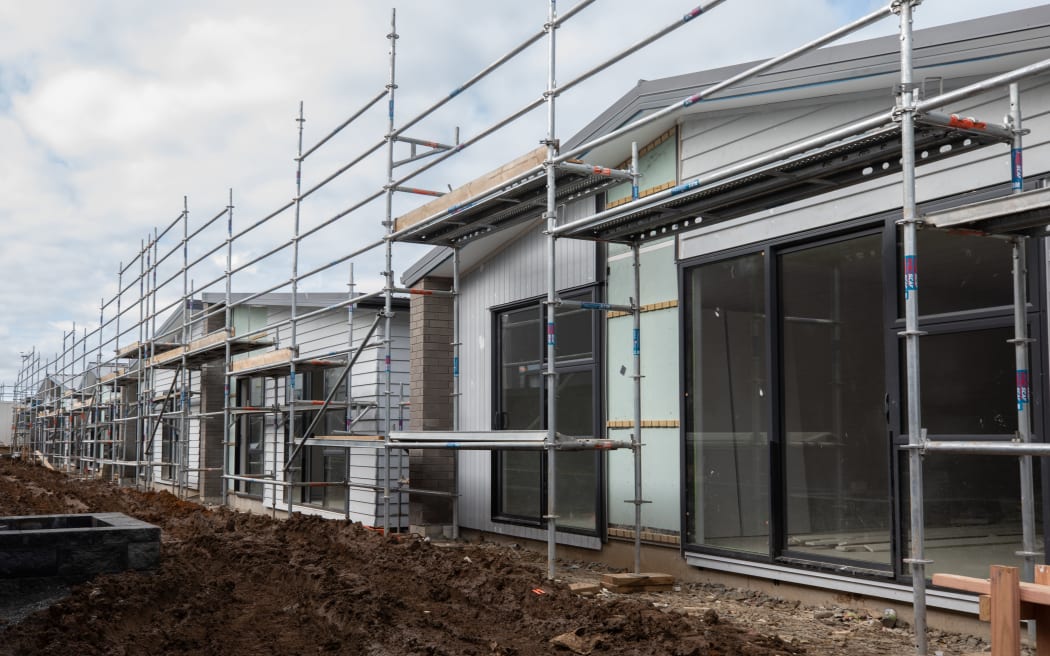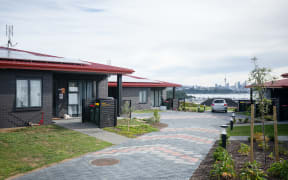
Home values in Auckland fell in the past three months. Photo: RNZ / Dan Cook
Analysis - Policy changes, a steady OCR rate, low construction costs, and the high cost of home ownership are all impacting the housing market. Here's what moved real estate this week.
Residential property values have barely changed with slow sales and a glut of listings.
And in a bid to attract more landlords, the government will present a bill on rental changes next month.
'Flat' residential property market
The QV House Price Index for March shows the national average home value rose 2.2 percent to $924,734 over the first three months of 2024.
Queenstown saw the most growth at 2.7 percent, then Wellington at 2 percent and Christchurch at 1.5 percent.
Auckland values fell the most at 0.2 percent.
"Flat remains the word of the year so far when it comes to the current state of New Zealand's residential property market," QV operations manager James Wilson said.
He expected little change over the winter months, given high interest rates and stretched household budgets.
The large number of properties on the market was giving buyers choice and helping maintain downward pressure on prices, he said.
Investors are yet to respond in large numbers to changes in tax policy, designed to make residential property a more desirable investment.
More options for landlords with tenancy law changes
After reinstating interest deductibility, the government is moving on a suite of changes to tenancy laws.
They include:
- Reintroducing 90-day 'no cause' terminations for periodic tenancies, meaning landlords can end a periodic tenancy without requiring a specific reason.
- Returning landlords' notice periods for ending a periodic tenancy to 42 days where:
- Returning tenants' notice period for ending a periodic tenancy to 21 days.
- Reintroducing landlords' ability to give notice to end a fixed-term tenancy at the end of the term without requiring a specific reason.
they want to move themselves or a family member into the property, or
the tenancy agreement notes the property is usually used to house employees, and they want to move an employee into the property, or
where the property is subject to an unconditional agreement for sale requiring vacant possession.
The government will introduce a bill to Parliament in May, with the measures expected to come into effect in early 2025.
Housing Minister Chris Bishop said the changes would make it easier for "mum and dad landlords" to get into the rental market, boost supply and put downward pressure on rents.
"We need more landlords in the market, but more fundamentally, we need to reform the RMA and our planning laws at the same time," Bishop told Morning Report on Friday.
The government wanted to "flood the market" with development opportunities so more houses were built, he said.
RMA changes
A small sentence in the National-New Zealand First coalition agreement could speed up development of papakāinga and address overcrowding, builders say.
The line suggests removing the need for consent for dwellings less than 60m2, instead requiring only an engineer's report.
Bishop said he intended to introduce the change as part of a Resource Management Amendment Bill this year.
Drop in construction activity despite drop in cost
The latest Cordell Construction Cost Index showed the construction cost growth rate had dropped to its lowest level in eight years.
CoreLogic chief property economist Kelvin Davidson said costs rose 0.5 percent in the first quarter, compared to the long-term quarterly average of 1.1 percent.
That would give more certainty to people building new homes and doing renovations but builders were experiencing a decline in their workloads and some were going into liquidation, he said.
It could be at least two years before any change from the government's fight for lower building costs was seen by consumers, Davidson said.
OCR
The Official Cash Rate (OCR) is still at 5.5 percent.
It has remained unchanged since May 2023, when inflation had fallen to 6 percent from 6.7 percent.
The Reserve Bank says increasing the OCR rates helps bring inflation down. Inflation is currently at 4.7 percent. The inflation target is 1-3 percent and RBNZ will review the OCR again in May.
ANZ chief economist Sharon Zollner said she did not expect cuts until 2025.
ASB chief economist Nick Tuffley told Stuff, no change in the OCR could mean a halt in interest rate hikes.
Recent surveys have shown business and consumer confidence slipping, as households keep a lid on their spending, and firms struggle with lower sales and high-interest rates.
Public housing
Prime Minister Christopher Luxon announced targets for the government to deliver in the next six years. It includes a 75 percent reduction of households in emergency housing.
The housing and finance ministers have already sent a letter demanding Kāinga Ora take a tougher stance on unruly social housing tenants.
It comes as a new social housing development opens in the Gisborne suburb of Tamarau which will house 31 families, many of whom are moving from motels or social housing.
Kāinga Ora manages more than 70,000 properties nationwide, accommodating nearly 185,000 people, with more than 160 homes built in Gisborne in the past three years.
It said another 162 state homes were in progress, and early plans were under way for about 120 more.





